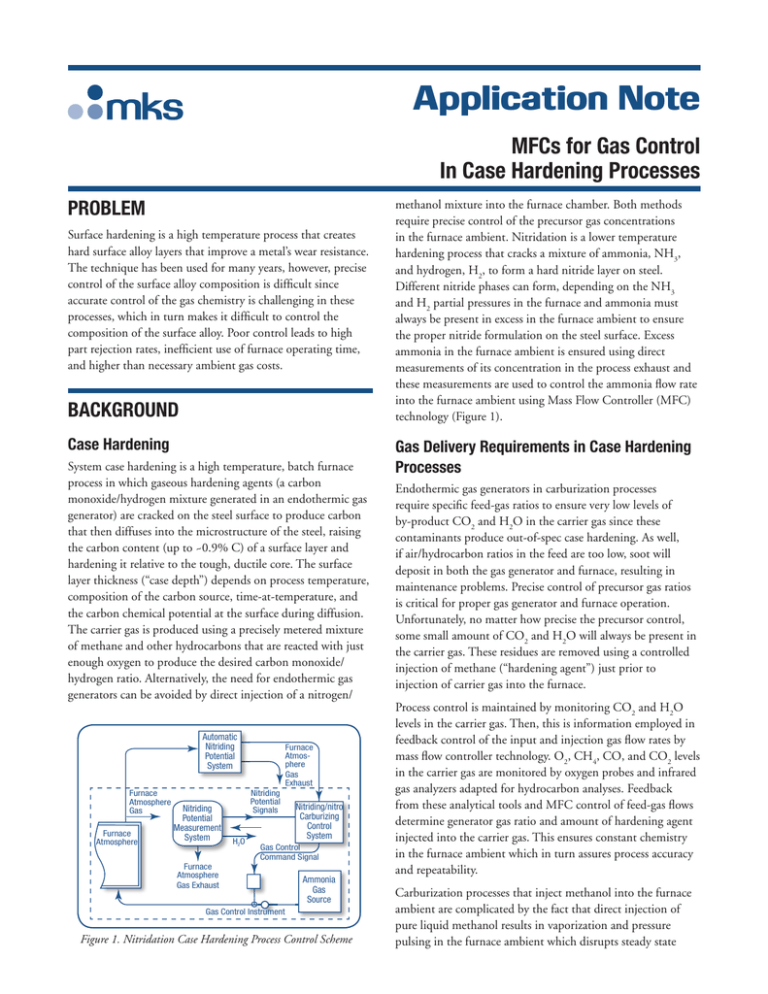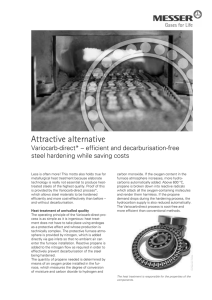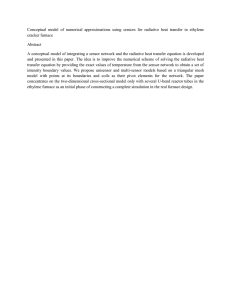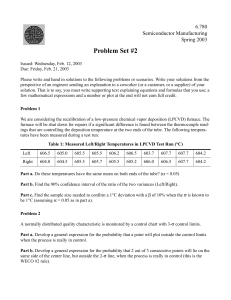
Application Note
MFCs for Gas Control
In Case Hardening Processes
PROBLEM
Surface hardening is a high temperature process that creates
hard surface alloy layers that improve a metal’s wear resistance.
The technique has been used for many years, however, precise
control of the surface alloy composition is difficult since
accurate control of the gas chemistry is challenging in these
processes, which in turn makes it difficult to control the
composition of the surface alloy. Poor control leads to high
part rejection rates, inefficient use of furnace operating time,
and higher than necessary ambient gas costs.
BACKGROUND
Case Hardening
System case hardening is a high temperature, batch furnace
process in which gaseous hardening agents (a carbon
monoxide/hydrogen mixture generated in an endothermic gas
generator) are cracked on the steel surface to produce carbon
that then diffuses into the microstructure of the steel, raising
the carbon content (up to ~0.9% C) of a surface layer and
hardening it relative to the tough, ductile core. The surface
layer thickness (“case depth”) depends on process temperature,
composition of the carbon source, time-at-temperature, and
the carbon chemical potential at the surface during diffusion.
The carrier gas is produced using a precisely metered mixture
of methane and other hydrocarbons that are reacted with just
enough oxygen to produce the desired carbon monoxide/
hydrogen ratio. Alternatively, the need for endothermic gas
generators can be avoided by direct injection of a nitrogen/
Automatic
Nitriding
Potential
System
Furnace
Atmosphere
Gas
Furnace
Atmosphere
Nitriding
Potential
Measurement
System
Furnace
Atmosphere
Gas Exhaust
Furnace
Atmosphere
Gas
Exhaust
Nitriding
Potential
Signals
H2O
Nitriding/nitro
Carburizing
Control
System
Gas Control
Command Signal
Ammonia
Gas
Source
Gas Control Instrument
Figure 1. Nitridation Case Hardening Process Control Scheme
methanol mixture into the furnace chamber. Both methods
require precise control of the precursor gas concentrations
in the furnace ambient. Nitridation is a lower temperature
hardening process that cracks a mixture of ammonia, NH3,
and hydrogen, H2, to form a hard nitride layer on steel.
Different nitride phases can form, depending on the NH3
and H2 partial pressures in the furnace and ammonia must
always be present in excess in the furnace ambient to ensure
the proper nitride formulation on the steel surface. Excess
ammonia in the furnace ambient is ensured using direct
measurements of its concentration in the process exhaust and
these measurements are used to control the ammonia flow rate
into the furnace ambient using Mass Flow Controller (MFC)
technology (Figure 1).
Gas Delivery Requirements in Case Hardening
Processes
Endothermic gas generators in carburization processes
require specific feed-gas ratios to ensure very low levels of
by-product CO2 and H2O in the carrier gas since these
contaminants produce out-of-spec case hardening. As well,
if air/hydrocarbon ratios in the feed are too low, soot will
deposit in both the gas generator and furnace, resulting in
maintenance problems. Precise control of precursor gas ratios
is critical for proper gas generator and furnace operation.
Unfortunately, no matter how precise the precursor control,
some small amount of CO2 and H2O will always be present in
the carrier gas. These residues are removed using a controlled
injection of methane (“hardening agent”) just prior to
injection of carrier gas into the furnace.
Process control is maintained by monitoring CO2 and H2O
levels in the carrier gas. Then, this is information employed in
feedback control of the input and injection gas flow rates by
mass flow controller technology. O2, CH4, CO, and CO2 levels
in the carrier gas are monitored by oxygen probes and infrared
gas analyzers adapted for hydrocarbon analyses. Feedback
from these analytical tools and MFC control of feed-gas flows
determine generator gas ratio and amount of hardening agent
injected into the carrier gas. This ensures constant chemistry
in the furnace ambient which in turn assures process accuracy
and repeatability.
Carburization processes that inject methanol into the furnace
ambient are complicated by the fact that direct injection of
pure liquid methanol results in vaporization and pressure
pulsing in the furnace ambient which disrupts steady state
Application Note
Page 2
operation. This is avoided by injecting an entrained
N2/methanol gas with tightly controlled ratios that are
maintained using MFC control.
Nitridation processes require a controlled excess of ammonia
in the furnace ambient that is maintained by exhaust analyses
and MFC control of feed-gases similar to that employed for
carburization. As well, precision gas flow control in nitridation
processes minimizes operational costs due to ammonia gas and
any need for high temperature processing steps.
SOLUTION
MKS Instruments has developed advanced thermal mass flow
controller technology for carburization- and nitridation-based
case hardening applications. MKS MFCs directly relate
volumetric gas throughput at standard reference conditions to
mass throughput per unit time, yielding measurements that are
independent of variations in the gas temperature and pressure.
Rugged industrial
applications such
as case hardening
require MFCs that
can withstand high
dust and moisture
environments. MKS
meets this need with
the I-Series family of Thermal Mass Flow Controllers and
Mass Flow Meters specifically designed for applications in
harsh environments. The enclosure of I-Series MFCs is
IP66-rated against direct water spray and fine dust. I-Series
MFCs feature the following characteristics:
•
•
•
•
•
•
Flow Rates from 5 sccm to 1000 slm
Ingress protection rating IP66 (dustproof & waterproof )
Multi-range/multi-gas capability; 1% of set point
accuracy
Single sided power supply: 15 to 25 VDC
Analog I/O options: 0 to 5 VDC; 4 to 20 mA
Digital I/O options: Profibus; RS485, Embedded
Modbus and Ethernet user interface
The integration of MKS Instruments’ digital MFC technology
with sensor technologies in closed loop control ensures
continuously adjustable gas flows and steady state conditions
during case hardening processes. In multi-step nitridation
processes with changing temperature profiles, MKS MFC’s
permit controlled, time-dependent gas flow ramps tailored to
furnace temperature transitions.
MKS Instruments offers a variety of standard industrial
communication protocols and is continually expanding MFC
options based on industry communication requirements
for other digital protocols such as EtherCAT and Profinet.
On board diagnostics, accessible via Ethernet TCP/IP
communications protocols, provide customers with the
ability to modify the setup of the MFC to control the
flow of different gases and to change the scale of the flow
measurement and control. The on-board diagnostics can
also be used to troubleshoot the functionality of the device,
providing plot functions for critical MFC variables.
CONCLUSION
The product quality and operational costs associated with
case hardening heat treatment processes such as carburizing
and nitriding are determined by the ambient gas atmosphere
and temperature in the furnace. Significant improvements in
throughput, reductions in gas costs, and improved run-to-run
consistency can be achieved by coupling appropriate sensor
technology with advanced MFC technology to achieve
real-time, adjustable gas flow rate control that maintains a
constant chemical composition in the furnace, which in turn
maintains a constant concentration of the hardening agent
at the gas/steel interface. MKS Instruments’ I-Series MFC
family of IP66-rated Thermal Mass Flow Controllers and Mass
Flow Meters for Industrial Environments have all the features
necessary for successful integration into case hardening
applications.
For more information on MKS Instruments’ I-Series MFC
Technology, link to: http://www.mksinst.com/product/
category.aspx?categoryid=415
For a general catalog of MKS Products, follow this link:
http://www.mksinst.com/index.asp
App. Note 05/16 - 7/16
© 2016 MKS Instruments, Inc.
All rights reserved.
MKS products provided subject to the US Export Regulations. Diversion or transfer
contrary to US law is prohibited. mksinst™ is a trademark of MKS Instruments, Inc.,
Andover, MA.
MKS Instruments, Inc.
Global Headquarters
2 Tech Drive, Suite 201
Andover, MA 01810
978.645.5500/800.227.8766
www.mksinst.com



